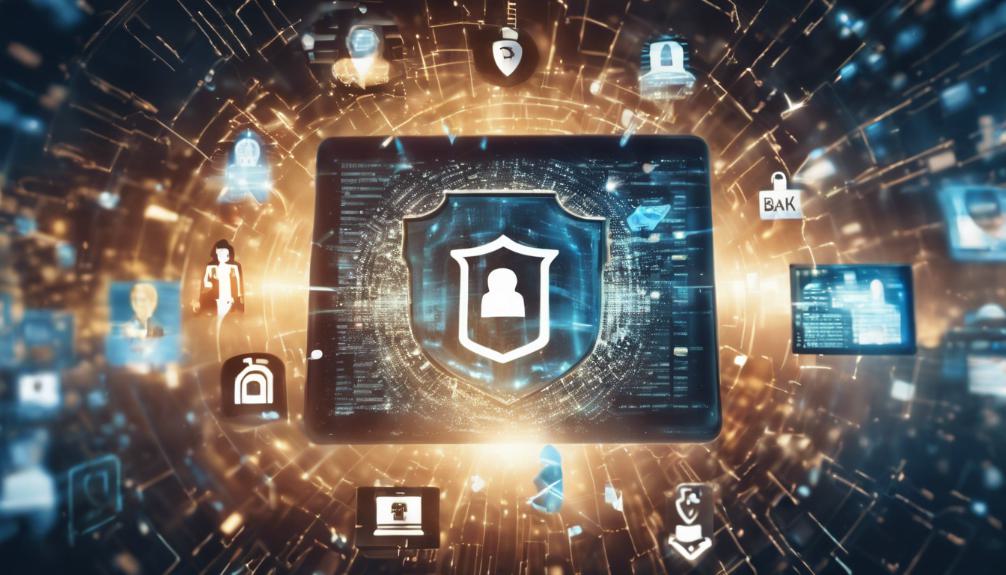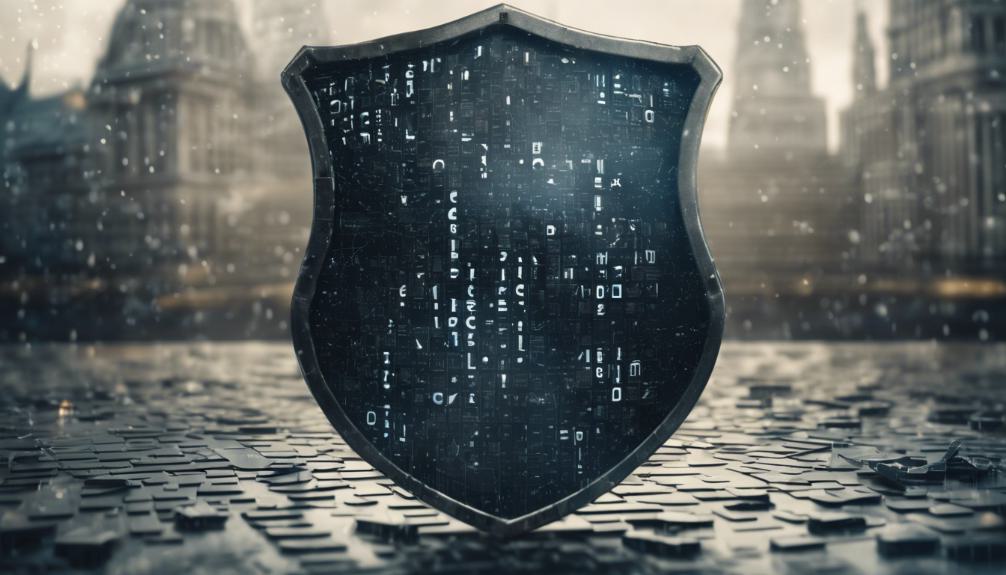Massive Data Breach Hits US Agencies, Banks
The recent massive data breach targeting US agencies and banks through the MOVEit file transfer utility underscores a critical vulnerability in our digital defenses—exposing millions of sensitive records to cybercriminals. This incident, facilitated by a SQL Injection flaw, CVE-2023-35708, not only highlights the sophistication of modern cyber threats but also the urgent need for fortified cybersecurity measures across all sectors. As legal battles mount and efforts to mitigate identity theft intensify, one must contemplate the broader implications of such breaches on national security, individual privacy, and the global economy. What strategies can institutions adopt to prevent future incidents, and how can individuals safeguard their digital footprint in an increasingly vulnerable cyberspace?
Key Takeaways
- Hackers exploited a vulnerability in MOVEit, impacting US federal agencies and banks.
- Millions of records, including personal and vehicle data, were stolen in the breach.
- The CLoP gang claimed responsibility for the attacks, with a $10 million bounty offered for information.
- Progress Software is working on patching the vulnerability, as organizations are advised on ransom negotiations.
Security Flaw Exposed

How did a critical security vulnerability in the MOVEit file transfer utility lead to a massive data breach affecting U.S. federal agencies, banks, and universities? The heart of the issue lay in the exploitation of a SQL Injection vulnerability, identified as CVE-2023-35708, which hackers targeted during the Memorial Day holiday. This vulnerability allowed unauthorized access to millions of sensitive records. Progress Software, the entity behind MOVEit, found itself in a race against time to patch this significant security flaw. Meanwhile, the CLoP gang, claiming responsibility for the attacks, leveraged this vulnerability to infiltrate databases, extracting a vast array of personal and institutional data. The breach's magnitude underscores the importance of robust cybersecurity measures and the need for constant vigilance in protecting digital assets and personal information.
Class Action Lawsuits

Progress Software now faces class action lawsuits due to the security vulnerability in its MOVEit file transfer utility, which led to extensive data breaches. These legal actions highlight the significant impact of the incident, underscoring the importance of robust cybersecurity measures and the obligation to safeguard personal and sensitive information. The litigation aims to hold Progress Software accountable for the breach, seeking compensation for the millions affected. For individuals and entities prioritizing service to others, these developments underscore the vital role of vigilance and proactive measures in protecting communities against digital threats. By advocating for transparency and accountability, the lawsuits serve as a pivotal step towards enhancing data security practices and preventing future breaches, thereby fostering a safer digital environment for all.
MOVEit Vulnerability Patched

In response to the class action lawsuits and the widespread data breaches, Progress Software has successfully implemented a patch for the CVE-2023-35708 vulnerability in its MOVEit file transfer utility. This decisive action underscores a commitment to safeguarding sensitive information and restoring trust among its vast user base. By addressing this critical issue head-on, Progress Software demonstrates its dedication to security excellence and the well-being of its clients. Users of the MOVEit utility are now urged to apply this patch promptly to protect their data from potential threats. This crucial measure is a crucial step in preventing future incidents, ensuring that organizations can continue to serve their communities effectively without the looming threat of data compromise.
CLoP Gang's Involvement

The CLoP gang, known for its cybercriminal activities, has claimed responsibility for the recent series of attacks exploiting the MOVEit file transfer utility's vulnerabilities. This acknowledgment has heightened concerns among cybersecurity experts and organizations dedicated to safeguarding sensitive information. As entities committed to serving the public interest, understanding the modus operandi of such groups is vital for strengthening defenses against future incursions. The CLoP gang's involvement underscores the sophisticated nature of threats facing institutions today, necessitating a concerted effort to bolster cybersecurity measures. By sharing knowledge and strategies, those dedicated to protecting others can better anticipate and mitigate the tactics employed by cybercriminals, reinforcing the collective resilience against such pervasive threats.
Breach Scale and Impact

Significant data breaches have compromised millions of records across U.S. federal agencies, banks, and universities, underscoring the extensive scope and profound impact of the cyberattacks. These incidents have not only exposed sensitive personal information but have also shaken the trust in institutions meant to safeguard our data. The ramifications extend beyond the immediate threat of identity theft and fraud. They highlight critical vulnerabilities within our digital infrastructures, prompting a reevaluation of cybersecurity measures. For those dedicated to serving others, these breaches underscore the importance of robust data protection strategies and the need for vigilance in safeguarding the information entrusted to them. It's a call to action for enhancing security protocols and fostering a culture of cybersecurity awareness to mitigate future risks.
Affected Entities

Among the entities hardest hit by the massive data breach were U.S. federal agencies, leading banks, and several universities, exposing millions to potential identity theft and fraud. This breach, a stark reminder of the vulnerabilities inherent in our interconnected systems, has prompted a swift response from those affected. Federal agencies are now scrutinizing their cybersecurity protocols, banks are reevaluating their data protection measures, and universities are reinforcing their digital defenses to safeguard the personal information of students and faculty. The collective effort to address the breach underscores a commitment to service and the protection of the public's trust. As these entities navigate the aftermath, their actions serve as a proof of the resilience and shared responsibility in the face of digital threats.
Personal Data Compromised

In light of the widespread data breach impacting U.S. federal agencies, banks, and universities, a detailed examination of the personal information compromised reveals extensive vulnerabilities. The breach, facilitated by a security flaw in the MOVEit file transfer utility, led to the unauthorized access of millions of records. The sensitive data exposed not only includes personal details but also driver's license numbers and vehicle information, underscoring the profound risk of identity theft and financial fraud these individuals now face. This incident highlights the critical need for robust data protection measures and serves as a stark reminder of the importance of safeguarding personal information. As we navigate this breach, it's imperative to focus on the protection and support of those affected, guiding them through the steps to secure their personal data against further exploitation.
Immediate Response Measures

Following the revelation of the massive data breach impacting U.S. federal agencies, banks, and universities due to a vulnerability in the MOVEit file transfer utility, immediate response measures have been initiated to mitigate the damage and protect the affected individuals. Recognizing the urgent need to safeguard personal and sensitive information, organizations affected by the breach are collaborating closely with cybersecurity experts and law enforcement agencies. These efforts are focused on identifying the extent of the breach, securing potentially exposed data, and enhancing security measures to prevent future incidents. Additionally, they are providing affected individuals with guidance on protecting their identity and personal information, including recommending steps such as monitoring financial accounts, changing passwords, and being vigilant against phishing attempts. These essential measures are crucial in restoring trust and ensuring the security of personal information.
Bounty on CLoP Information

Responding to the severe impact of the MOVEit data breach, the US State Department has announced a $10 million bounty for information leading to the identification or location of the CLoP cybercriminal gang members responsible. This proactive measure reflects the government's commitment to safeguarding citizens' data and the integrity of national security systems. By incentivizing the global community to contribute valuable intelligence, this initiative not only seeks to bring the perpetrators to justice but also to deter future cybercriminal activities. The collaboration between international law enforcement and the public in this endeavor underscores a collective effort to protect vulnerable populations from the repercussions of such breaches, demonstrating a unified front against cyber threats and reinforcing the importance of cybersecurity vigilance.
Identity Theft Prevention

Given the escalating threat of identity theft in the wake of recent data breaches, it is imperative for individuals to adopt thorough measures aimed at safeguarding their personal information. Essential steps include monitoring bank statements and credit reports regularly for any unauthorized transactions or accounts. Implementing strong, unique passwords across different accounts and enabling two-factor authentication wherever possible can greatly reduce the risk of unauthorized access. Additionally, it's vital to be vigilant against phishing attempts by verifying the authenticity of emails and phone calls before providing personal information. For those particularly affected by data breaches, considering a credit freeze might be a prudent measure, as it restricts access to your credit report, making it more difficult for identity thieves to open new accounts in your name.
Seeking Legal Recourse

Victims of the recent massive data breach involving US agencies and banks may consider pursuing legal action to seek compensation for damages incurred. This step can be particularly meaningful for those who value serving others, as legal recourse not only seeks to rectify personal losses but also to hold accountable entities responsible for safeguarding data. Engaging in legal action requires understanding the intricacies of privacy laws and the specifics of the breach. It's advisable to consult with legal professionals experienced in data breach cases who can navigate the complex legal landscape. These experts can offer guidance on the viability of a lawsuit and the potential for joining class-action suits, thereby amplifying the impact of one's action in pursuit of justice and accountability.
Compensation and Rights

Understanding one's legal rights and potential avenues for compensation is a significant step for those affected by the recent data breach. Victims are entitled to seek reparation for financial harm, wasted time, and emotional distress caused by the unauthorized disclosure of their personal information. Legal assistance is available, often with no upfront costs, providing a pathway to address grievances and secure just compensation. It is important to act promptly, consulting with legal experts who can guide through the complexities of data breach laws and guarantee rights are fully exercised. Engaging in this process not only aids in personal recovery but also contributes to broader efforts in holding entities accountable for safeguarding private data, ultimately serving the greater good by enhancing data protection standards for all.
Frequently Asked Questions
How Can Individuals Verify if Their Data Was Specifically Part of the Stolen Records?**
To ascertain if one's personal data was compromised in the recent breach, individuals should first consult the official breach notification from the impacted entities. Subsequently, they may check their status on reputable websites designed for victims of data breaches. Engaging with credit monitoring services can also offer alerts to any unusual activities, potentially signaling unauthorized use of personal information. Proactive communication with these services and relevant authorities can further confirm one's exposure in such incidents.
What Are the Psychological Impacts of Data Breaches on Victims, and How Can They Seek Help?**
Data breaches, while unsettling, can deeply impact individuals' mental well-being, leading to anxiety and a feeling of violation. Those affected may seek support from counseling services to navigate these emotional disturbances. Additionally, joining support groups with similar experiences can offer solace and understanding. Engaging with professionals who specialize in data breach trauma can also provide strategies to rebuild one's sense of security and peace of mind in the digital age.
Can Small Businesses Also Be Affected by Such Breaches, and What Steps Should They Take if They Suspect Data Compromise?**
Certainly, small businesses are vulnerable to data breaches and must act diligently to safeguard sensitive information. If a compromise is suspected, immediately initiate a security audit to identify and rectify any vulnerabilities. Notify affected parties promptly and transparently, and consider engaging cybersecurity professionals for thorough investigation and future protection. Comply with legal obligations regarding data breaches, and explore cyber insurance options to mitigate potential financial impacts. Proactive measures and swift response are essential.
How Do Data Breaches Like This One Influence Future Cybersecurity Policies and Regulations?**
Data breaches of this magnitude act as a wake-up call, illuminating the vulnerabilities in our cybersecurity armor. For those dedicated to safeguarding personal and organizational data, these incidents underscore the urgent need for strengthened cybersecurity policies and regulations. They compel lawmakers and cybersecurity professionals to forge robust defenses against emerging threats. Consequently, future cybersecurity measures are likely to be more stringent, encompassing both preventive strategies and more rigorous compliance requirements to protect against similar breaches.
What Long-Term Security Measures Are Organizations Implementing to Prevent Recurrence of Similar Breaches?**
To mitigate future risks and prevent recurrences of similar breaches, organizations are implementing thorough long-term security measures. These include adopting advanced cybersecurity frameworks, enhancing encryption methods, and conducting regular vulnerability assessments. Additionally, there is a greater emphasis on employee training regarding security best practices and the establishment of more rigorous incident response protocols. Organizations are also investing in cutting-edge technologies like AI and machine learning for real-time threat detection and response.
Conclusion
In the digital age, akin to a modern Pandora's box, the MOVEit data breach has released unforeseen vulnerabilities upon a networked society, revealing the fragility of cyber fortifications. As the CLoP gang's shadow looms large, this event serves as a somber allegory for the eternal battle between security and malfeasance. It underscores the imperative for vigilance, collective resilience, and the pursuit of justice to safeguard the sanctity of digital domains, ensuring that hope remains within the box, even when all else seems lost.

This post has been generated by AI and was not reviewed by editors. This is Not legal advice. Please consult with an attorney.

